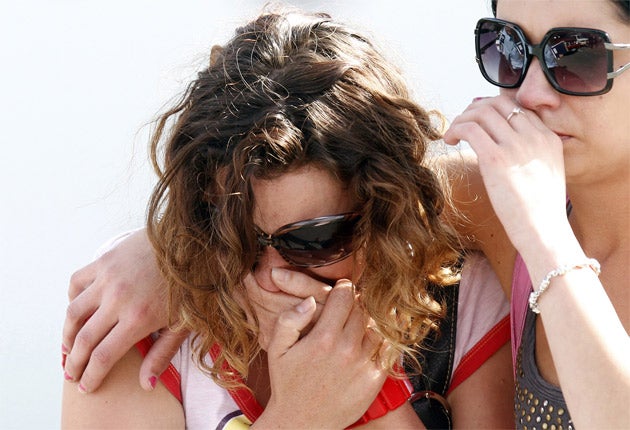New Zealand mourns as blast ends rescue hope

Your support helps us to tell the story
From reproductive rights to climate change to Big Tech, The Independent is on the ground when the story is developing. Whether it's investigating the financials of Elon Musk's pro-Trump PAC or producing our latest documentary, 'The A Word', which shines a light on the American women fighting for reproductive rights, we know how important it is to parse out the facts from the messaging.
At such a critical moment in US history, we need reporters on the ground. Your donation allows us to keep sending journalists to speak to both sides of the story.
The Independent is trusted by Americans across the entire political spectrum. And unlike many other quality news outlets, we choose not to lock Americans out of our reporting and analysis with paywalls. We believe quality journalism should be available to everyone, paid for by those who can afford it.
Your support makes all the difference.First came hope, with revelations that a safety helmet had been found, with its light still on, and that rescuers were finally poised to enter the Pike River coal mine. Then came "the cruellest of news": there had been a second underground explosion, this one so powerful that none of the 29 men trapped below could have survived.
Some family members collapsed when the news was delivered yesterday; others screamed and railed at police. After five days of uncertainty and anguish, the human tragedy unfolding in an isolated corner of New Zealand's South Island had reached a dramatic and grim conclusion.
The second blast, thought to have been caused by a build-up of toxic gases in the mine's network of tunnels, plunged the country into national mourning. For the town of Greymouth, on the west coast, home to many of the men, it was "our darkest hour", said the mayor of the Grey District, Tony Kokshoorn.
Two Britons are entombed in the mine at Atarau: Pete Rodger, 40, from Perthshire, who moved to New Zealand two years ago to be near to his mother and sister, and Malcolm Campbell, 25, from St Andrews, who was due to marry his fiancée, Amanda Shields, next month.
During the agonising wait, families clung to hope that their loved ones might be alive, buoyed by the survival stories of Chile's 33 buried miners. But this time there was no happy ending, just excruciating grief – for relatives of the fathers, sons, brothers, husbands and partners who would never come home.
Pike River's owner, Peter Whittall, was close to tears as he broke the news. He knew every one of the 29 men personally. "I'm unlikely to see my workmates again, and unlikely to see them walk out of that mine," he said later.
Compounding the families' pain is the fact they will never know whether the miners – who ranged from a 17-year-old on his first shift to a 62-year-old – survived the first explosion last Friday. Yesterday, some family members vented their anger at what they saw as a botched rescue operation.
Laurie Drew, whose 21-year-old son, Zen, is among the dead, said rescuers should have gone into the mine last Friday, when – he believes – the initial explosion would have burned off most of the gases. "They had their window of opportunity that Friday night, and now the truth can't come out, because no one alive will be able to come out and tell the truth about what went on down there."
Mr Whittall said the second blast demonstrated that authorities had acted correctly in refusing to allow rescue teams to enter tunnels containing dangerous levels of methane and carbon monoxide.
However, questions are being asked about safety at the mine, which opened in 2008, and about the wisdom of mining a coal deposit known to be gaseous. The Prime Minister, John Key, announced a commission of inquiry to investigate events surrounding the country's worst mining disaster since 1914.
Mr Key said families had received "the cruellest of news", and he assured them that "New Zealand stands shoulder to shoulder with you". Flags across the country will fly at half-mast today, and parliament will adjourn as a mark of respect.
Earlier yesterday, a drilling team finally finished boring a shaft through to the area where the men were believed to be, and two robots – one of which found the helmet – gave authorities their first images from inside the mine.
Then came the devastating blast, at 2.37pm local time. Mr Kokshoorn, who was present when relatives were informed about it, said: "They just sobbed openly, just fell to the floor."
The Energy Minister, Gerry Brownlee, said efforts would be made to recover the bodies. But with the mine still dangerous, it was not clear last night when grieving families would be able to bury their dead.
Join our commenting forum
Join thought-provoking conversations, follow other Independent readers and see their replies
Comments